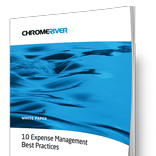
When it comes to real-time insights and comprehensive analyses, knowledge is power. But stockpiling data is one thing; it’s quite another to turn expense reports and other information into valuable insights.
Imagine your organization employs 20, 30 or even a hundred certifiable geniuses, each an expert in specific areas. These experts are isolated in separate offices; while each has a phone, each expert can only call their immediate neighbors. And one more thing — they speak different languages.
Sure, some communication is possible, but you’re not really taking advantage of your organization’s brain trust. Now imagine bringing all of these experts into one big room with excellent translators, allowing them to converse and circulate freely. This is essentially the first thing an analytics platform does. It connects all of the data resources, improving transparency and the flow of information.
Thanks to commercially available analytics platforms and enhanced computing capacity, many organizations can now organize and connect this data in a timely fashion, according to an article on the wiredFINANCE blog. But for organizations to successfully turn their data into valuable strategic tools and assets, such as business expense reports, they must overcome several obstacles.
- By nature, “big data” is ambiguous and difficult to understand. Depending on the organization, useful data streams in through numerous channels and formats, from internal enterprise information to CRM reports and relevant third-party or public databases. Chrome River’s analytics platform makes it easier to integrate multidimensional sources with more than 300 other enterprise-information sources, creating dashboards and reports in several formats.
- Turning data into business insights requires more than analytics. It also must be easy for managers to use without requiring IT intervention. Users should have access to all the features they need to transform enterprise data into compelling and actionable reports without intervention from technical staff.
- Using data strategically requires leadership and new ways of thinking. A solid analytics platform can facilitate fast, effective decision-making and the smooth execution of day-to-day operations.
In the end, the ability to overcome these three hurdles may be what puts an organization ahead of its competitors. We’d like to learn from your experiences with “big data” projects. What do you see as the major obstacles to deriving real value from an organization’s data? Perhaps the first project can be mining your company's expenses to learn the true cost of sales. Let us know by posting in the comments section!
Search
Subscribe
Latest Posts
Posts by Category
Our choice of Chrome River EXPENSE was made in part due to the very user-friendly interface, easy configurability, and the clear commitment to impactful customer service – all aspects in which Chrome River was the clear winner. While Chrome River is not as large as some of the other vendors we considered, we found that to be a benefit and our due diligence showed that it could support us as well as any large players in the space, along with a personalized level of customer care.
We are excited to be able to enforce much more stringent compliance to our expense guidelines and significantly enhance our expense reporting and analytics. By automating these processes, we will be able to free up AP time formerly spent on manual administrative tasks, and enhance the role by being much more strategic.
